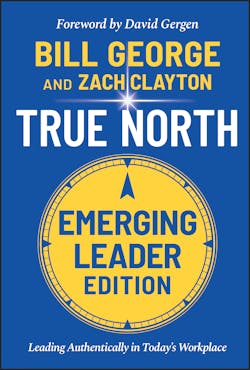Time to Let Young Leaders Take Control
No more waiting. It’s time for current leaders to move the next generation of leaders to their rightful place.
A bold statement perhaps, but Bill George, the former CEO of Medtronic and currently a professor of ethics at Harvard Business school has studied leadership for a long time.
Leadership values have changed. “The Baby Boomer's style of leadership is often not in touch with the current needs of the workforce,” says George. “Employees’ core beliefs are different and the younger leaders that embrace those beliefs need to be moved up in the organization.”
IndustryWeek talked to George to understand the concepts in his new book and to get his take on a broad range of issues.
IW: How has the leadership style changed?”
BG: In the old days, you worked with your hands. I’m an industrial engineer trained at Georgia Tech and my first job had to do with timing and motion studies. Then in the 1970s, the focus was on finding the smartest person in the room and putting them in charge of running the numbers. But today it’s all about the heart. It’s your passion for the work, empathy for employees and compassion for the customers you serve. The four most important qualities of leadership now are passion, compassion, empathy and courage.
And this is why I wrote the book. It is a call to emerging leaders to discover their True North and follow their North Star. True North is the moral compass that guides someone’s actions, and the North Star is the purpose that someone pursues to create a better world.
IW: Does following your True North involve feeling your goals are aligned with your organization?
BG: Exactly and for that reason, in the introduction to the book I explain that the first time I walked into Medtronic I felt intensely alive and could say this is the real me as I had joined a group of talented people dedicated to a mission to help others become healthy.
It’s the alignment between what’s important to me and what’s important for the company that I work for. That should be the case for all employees and is what younger people are looking for in their careers. You need to make sure you and the company share the same values. Everyone has to pull in the same direction. And if you don’t then you should move on to a company that you are aligned with.
IW: Along with alignment is the ability to be authentic in the workplace. How is that changing?
But it needs to go further than this. Employees today have found their voice and if leaders don’t ask these employees their opinions they will leave. So, managers need to listen to what employees want.
Looking at the front line, especially given their performance during the pandemic, we need to upgrade their compensation and opportunities. To find out what opportunities those might be you need to talk with everyone in your company, and come out of your office. Executives spend too much time looking at dashboards and should instead be walking around the company. When I ran Medtronic, I would sit in the lunchroom and find out what people needed. They will tell you both about their needs and the needs of the company such as better equipment.
You need to be engaged with everyone. Ask about their families. And make sure that the environment is inclusive. We need to move past identifying particular traits of people, such as gender, race, education and other labels, to understand what people are passionate about and build a team that is bonded on that.
Younger leaders expect that from senior leaders and won’t stay unless they feel they really belong. They want to be proud to tell their families that they work at this company. It’s a big change and leaders need to understand this.
IW: How can manufacturing companies attract and retain talent, given the ‘great resignation’?
BG: The current labor situation is a combination of things all converging. However, in my life, and many others, there has never been an event like the pandemic. It has had a profound effect on everyone. People were afraid and this caused everyone to reflect on their lives.
The result from a company standpoint is that those that have a progressive outlook on employee relations will come out in front and be able to attract as well as retain the best people.
It’s a big change for many companies to bring more attention to the human side of the organization. The number one thing companies must do is protect employee health. Employees have all of the knowledge of your business, your products and the quality of the products. Every night that brain power walks out the door, so you have to make sure they come back since who can replicate the knowledge that they have?
We need to look at the structure of our organization. There are way too many layers of middle management and too many consultants. The pandemic showed us who risked their lives to produce the products that we needed. The front-line workers need to be honored for their sacrifices and need to paid a lot more. It’s very hard to live on minimum wage and even $15 an hour. One way to raise the wages is to promote from within and move line managers into mentors and trainers. These are higher-skilled jobs that pay more.
IW: In the book, you talk about how leadership values have changed from the 20th century to the 21st-century.
BG: There are many changes but one I think we especially need to focus on switching from using IQ to choose leaders and instead use EQ, or emotional intelligence. The good news is that unlike IQ, which doesn’t change as we age, EQ can be developed. In the book, I give the example of the CEO at Microsoft who turned the culture around using EQ. Companies can go from the "know-it-all attitude" to the "learn it all attitude."
Other characteristics that have changed from the 20th century to the 21st include truth-telling, transparency and trust. Moving toward these characteristics will determine the success of companies in the future. And younger leaders embrace these characteristics in their leadership styles.
Don’t hold these leaders back. Move them into the key positions and watch how well they do.


